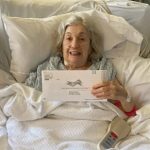Nurses Provide “SAFE” Care for Patients Who Have Experienced Domestic Violence
 As we come to the end of October, which is identified as Domestic Violence Awareness month, we know that unfortunately, the issue of Domestic Violence will not disappear with the end of the month.
As we come to the end of October, which is identified as Domestic Violence Awareness month, we know that unfortunately, the issue of Domestic Violence will not disappear with the end of the month.
Domestic Violence (DV) or Intimate Partner Violence (IPV) has been identified as a major public health problem , with 1 in 4 women and 1 in 9 men experiencing physical violence, sexual violence or stalking in their lifetime.(CDC,2017). In New Jersey, this means that over 2 million people have experienced IPV and over 1.8 million people have experienced sexual violence. These experiences can have not only immediate, but also long term effects on health, impacting physical and mental health and affecting how survivors interact with the healthcare system.
The average NJ resident interacts with a healthcare professional at least 3 times a year, giving us a unique opportunity to identify and address violence with our patients, and to help reduce both immediate and long-term consequences. Nurses, as the “most trusted” health care professionals , are particularly well positioned to make a difference. To support these efforts, NJSNA is a member of the NJ Health Cares about Domestic and Sexual Violence Collaborative, whose vision is: a NJ healthcare culture where all professionals in all settings recognize both the prevalence and health effects of domestic and sexual violence, practicing trauma-informed care through a lens of cultural humility, and the mission of providing education, tools and resources to achieve this goal.
Nurses can utilize the “SAFE” approach to provide the best care to survivors.
S= Screen, Support and Support: Screen all patients/clients for a current or past history of domestic/sexual violence; Share information about DV/SV and their effects on health with patients/clients (regardless of whether or bot they screen positive) and Support clients/patients where they are.
A = Assess: All clients/patients for current safety, and for the possible effects of violence on their health.
F = Facilitate: Healing with referrals to resources and support
E= Educate: Everyone, encourage empowerment, validate experiences.
The Collaborative can be reached: njhealthcares@gmail.com, https://www.facebook.com/njhealthcares/




